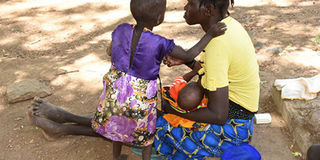Give women say in reproductive health rights, family planning

Viola Eburo, 24, cuddles her two children at her home in Tiaty, Baringo County, on October 3, 2019. She has eight children and does not embrace family planning. PHOTO | FILE | NATION MEDIA GROUP
What you need to know:
- Population Reference Bureau statistics show Kenya loses 5,500 mothers yearly to pregnancy- and birth-related complications.
- Indeed, such grim figures can be avoided if women are free to decide on the number and spacing of their children.
At a recent forum for journalists, we were told a sad story of a married mother of many children who has lost her bid to plan her now unmanageable family.
The youthful mother is in a polygamous marriage in a rural area. Here, among one of Kenya’s fiercely polygamous communities, the number of wives and children a man has is an indicator of his wealth.
She needed quality life, she figured, if only for the children. The man of the house could, clearly, no longer support them in these hard economic times. However, not to sire more children was not an option as far as he was concerned.
OVERBURDENED
And so the overburdened mother made a decision: She would be on contraceptives. She approached a younger co-wife and confided in her that she would seek family planning services. She made a deal with her co-wives that they continue “giving’’ their husband children as she focused on raising hers.
But somebody leaked the secret and the man gave the “rebel’’ two options: Adopt family planning and leave the marriage or continue giving birth and remain his wife. She chose to remain.
This woman’s is not an isolated case. There are many women, especially in rural areas, struggling to raise many children.
Despite the poverty, they continue giving birth. This is either due to ignorance, retrogressive cultural practices that shun family planning or, most unfortunately, lack of access to family planning.
CONTRACEPTIVES
There really should be no reason for anyone, woman or man, not to access contraceptives in this day and age. The government must ensure that the woman is empowered to plan her family, and life, through family planning if she wants it.
There’s no debate that the well-being of women and girls translates to that of families, communities and the entire nation.
There must be political will to not only empower women, girls and the youth to access their sexual and reproductive health rights but to also invest in family planning. This includes access to information, policies and services that prevent unplanned pregnancies and to have a say on the number of children to have, how to space them and when to have a child.
The national and county governments must take the lead in removing barriers to empowerment, education and progress of women and girls. All must know that family planning not only prevents unwanted pregnancies but also protects mothers’ and children’s lives.
FAMILY PLANNING
Population Reference Bureau (PRB) statistics show Kenya loses 5,500 mothers yearly to pregnancy- and birth-related complications. The data also shows that one in every 19 Kenyan children die before their fifth birthday.
Angeline Siparo, PRB’s Country Director, Kenya and Regional Technical Advisor, East and Southern Africa, contends that if counties prioritised family planning, we could avert the loss of an additional 2,138 lives by 2020.
Indeed, such grim figures can be avoided if women are free to decide on the number and spacing of their children. That is why propagandists, hypocrites, busybodies and self-seeking politicians who seek to dictate to women what to do with their bodies must be called out.
As we head into the electioneering season, the politicians are wont to ask women to give birth to countless children for their communities can have “the numbers” and, hence, votes. Never mind that those making the call have an average of four children whom they can comfortably raise!
PROPAGANDA
And, for the same reasons, let us shun those misrepresenting, through propaganda and misinformation, the International Conference on Population and Development (ICPD25). The high-level three-day summit in Nairobi from November 12 is convened by the Kenyan and Danish governments in partnership with the United Nations Population Fund (UNFPA).
Empowerment of women and girls, the power of gender equality, youth leadership and universal access to sexual and reproductive health and rights, and upholding the same, will be the key issues at ICPD25.
Ms Rugene is consulting editor. [email protected] @nrugene





